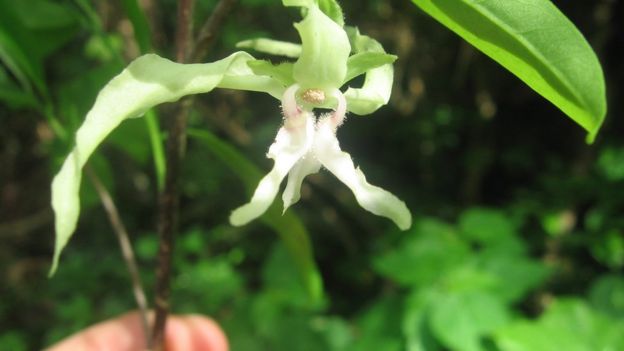 An example of a critically endangered tree species from Tanzania
The findings of the study, published in Science Advances, are based on a revised method for assessing extinction risk.
Official assessments of extinction are recorded in The Red List of Threatened Species, published by the International Union for Conservation of Nature - IUCN.
An example of a critically endangered tree species from Tanzania
The findings of the study, published in Science Advances, are based on a revised method for assessing extinction risk.
Official assessments of extinction are recorded in The Red List of Threatened Species, published by the International Union for Conservation of Nature - IUCN.
 Example of an endangered orchid species from Cameroon and Gabon
So far, almost nine in 10 mammals and two-thirds of birds have been assessed, but less than 8% of vascular plants (flowering plants and most other plants, excluding mosses and algae).
The researchers used a similar, but more speedy, method to assess the likely extinction risk of more than 20,000 plant species.
They found that 33% of the species are potentially threatened with extinction, and another third of species are likely rare, potentially becoming threatened in the near future.
This is mainly due to human activities such as deforestation, land-use changes, population growth, economic development, and climate change, they said.
Example of an endangered orchid species from Cameroon and Gabon
So far, almost nine in 10 mammals and two-thirds of birds have been assessed, but less than 8% of vascular plants (flowering plants and most other plants, excluding mosses and algae).
The researchers used a similar, but more speedy, method to assess the likely extinction risk of more than 20,000 plant species.
They found that 33% of the species are potentially threatened with extinction, and another third of species are likely rare, potentially becoming threatened in the near future.
This is mainly due to human activities such as deforestation, land-use changes, population growth, economic development, and climate change, they said.
DISCLAIMER: The Views, Comments, Opinions, Contributions and Statements made by Readers and Contributors on this platform do not necessarily represent the views or policy of Multimedia Group Limited.
Latest Stories
-
Let’s prioritize research quality in higher education institutions for industrial growth-Prof. Nathaniel Boso
29 mins -
Herman Suede is set to release ‘How Dare You’ on April 24
4 hours -
Heal KATH: Kuapa Kokoo, Association of Garages donate 120k to support project
4 hours -
KNUST signs MOU with Valco Trust Fund, Bekwai Municipal Hospital to build student hostel
5 hours -
The influence Ronaldo has on people, Cadman Yamoah will have same on the next generation – Coach Goodwin
5 hours -
Gender Advocate Emelia Naa Ayeley Aryee Wins prestigious Merck Foundation Awards
6 hours -
South Africa bursary scandal suspects granted bail
7 hours -
Ecobank successfully repays $500m Eurobond due April 18
7 hours -
Re: Doe Adjaho, Torgbui Samlafo IV, call for Unity among Paramountcies in Anlo
7 hours -
Extortion and kidnap – a deadly journey across Mexico into the US
7 hours -
Rihanna says fashion has helped her personal ‘rediscovery’ after having children
7 hours -
Development Bank Ghana targets GH¢1bn funding for commercial banks in 2024
7 hours -
Shatta Movement apologises to Ghana Society of the Physically Disabled after backlash
8 hours -
Sammy Gyamfi writes: Tema-Mpakadan Railway Project; A railway line to nowhere
9 hours -
Bright Simons: Is the World Bank saving or harming Ghana?
9 hours

